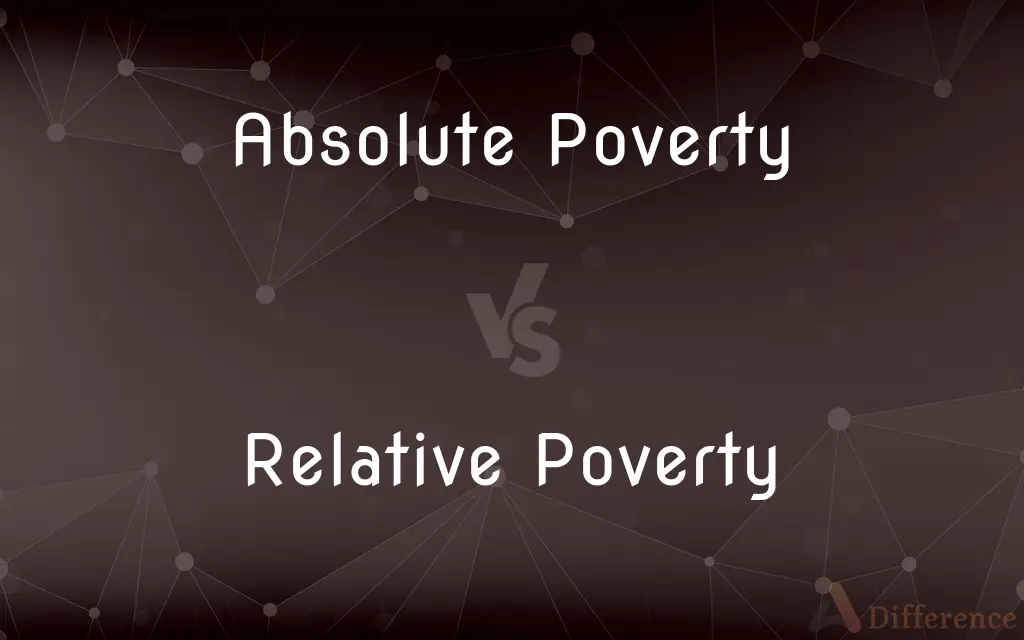Absolute Poverty vs. Relative Poverty — What's the Difference?
Edited by Tayyaba Rehman — By Fiza Rafique — Published on December 19, 2023
Absolute Poverty refers to a set standard, often based on income, below which a person cannot afford basic necessities. Relative Poverty compares an individual's income to the median or average income in their society or region.

Difference Between Absolute Poverty and Relative Poverty
Table of Contents
ADVERTISEMENT
Key Differences
Absolute Poverty is a fixed standard or threshold below which people are considered impoverished, regardless of their societal context. It typically refers to a minimum level of income required to sustain a certain quality of life. People falling below this threshold can't afford basic human needs, such as food, shelter, and clothing. On the other hand, Relative Poverty isn't about a specific threshold but rather about inequality. People in Relative Poverty earn significantly less than the average income in their society, making them relatively poorer. Their situation isn't necessarily about lacking basic needs, but about lagging behind the general standard of living in their environment.
In Absolute Poverty, standards are consistent and universal, often dictated by globally accepted measures. For example, the World Bank might define absolute poverty as living on less than $1.90 a day. Relative Poverty, conversely, is defined differently in every region or country based on its economic distribution. In wealthy countries, relative poverty might mean earning less than 50% of the median income, even if that income would be considered wealthy in another country.
The consequences of Absolute Poverty are often dire, encompassing hunger, lack of access to healthcare, and no shelter. People facing absolute poverty struggle with survival. Those in Relative Poverty, however, might have their basic needs met, but they face challenges accessing opportunities and amenities available to their peers. The effects are more related to social exclusion and relative deprivation.
Measuring Absolute Poverty is relatively straightforward, as it requires comparing individuals or households to a fixed threshold. Relative Poverty, however, requires assessing the entire income distribution of a region to find where someone falls. Both measures are crucial to understanding the multifaceted nature of poverty and designing interventions to alleviate it.
Comparison Chart
Definition
Fixed income threshold
Income in relation to society's median
ADVERTISEMENT
Comparison Basis
Universal standards
Local or regional standards
Effects
Lack of basic necessities
Social exclusion, relative deprivation
Measurement
Fixed benchmarks (e.g., $1.90/day)
Percentage of median income
Change with Economy
Remains constant
Varies with societal income levels
Compare with Definitions
Absolute Poverty
Living conditions where basic human necessities are unattainable.
Regions struck by famine see high rates of absolute poverty.
Relative Poverty
Earning significantly less than the average income of one's society.
Even in developed countries, many live in relative poverty, struggling to keep up with the standard of living.
Absolute Poverty
A monetary measure below which individuals can't maintain a healthy existence.
International efforts aim to reduce the numbers of people living in absolute poverty.
Relative Poverty
A measure of economic inequality within a particular region.
Economic booms can still see high levels of relative poverty if wealth distribution is skewed.
Absolute Poverty
A specific threshold, often global, dictating minimum resources for survival.
Organizations work to uplift those in absolute poverty, ensuring they have shelter and sustenance.
Relative Poverty
A situation where one's income doesn't match up to the evolving standards of society.
Rapid urban development often results in increased relative poverty as costs of living rise.
Absolute Poverty
An income level below which basic needs can't be met.
Millions live in absolute poverty, unable to afford even basic food.
Relative Poverty
Being poorer in comparison to one's neighbors or peers, even if basic needs are met.
In affluent suburbs, individuals might experience relative poverty if they can't afford the same luxuries as their peers.
Absolute Poverty
A condition where essential life-sustaining resources are lacking.
The documentary highlighted the harsh realities of absolute poverty in underdeveloped nations.
Relative Poverty
A comparison to the societal median, indicating lesser access to amenities and opportunities.
Relative poverty can lead to feelings of exclusion and deprivation.
Common Curiosities
How does Relative Poverty differ?
Relative Poverty compares an individual's income to the median or average in their society, indicating economic inequality.
Can someone in Relative Poverty still meet basic needs?
Yes, they might meet basic needs but still earn significantly less than the societal average, leading to relative deprivation.
Are Absolute Poverty thresholds the same worldwide?
Generally, yes. Absolute Poverty often has universal benchmarks, like living on less than $1.90 a day by World Bank standards.
How does economic growth affect Relative Poverty?
Economic growth can either reduce or increase Relative Poverty, depending on how wealth is distributed in society.
How is Absolute Poverty measured?
By comparing individuals or households to fixed, often globally accepted thresholds.
Can a wealthy country still have high Relative Poverty?
Yes, if income distribution is uneven, there can be high levels of Relative Poverty despite overall wealth.
Why is Absolute Poverty a concern?
Absolute Poverty results in dire consequences like hunger, lack of shelter, and no access to healthcare.
Is Relative Poverty subjective?
Yes, it's based on regional or societal standards and can vary based on the economic distribution in a region.
What is Absolute Poverty?
Absolute Poverty refers to a fixed standard below which individuals can't afford basic human necessities.
Are most poverty interventions aimed at addressing Absolute or Relative Poverty?
Interventions vary; some target Absolute Poverty directly, while others aim to reduce economic inequality, addressing Relative Poverty.
Why is understanding both Absolute and Relative Poverty important?
Both provide insights into different facets of poverty, helping design comprehensive interventions.
Can economic growth affect Absolute Poverty levels?
While economic growth can help reduce Absolute Poverty, the threshold itself remains constant.
Can a person be above the Absolute Poverty line but still be in Relative Poverty?
Yes, they might have basic needs met but still earn less than the societal average.
How is Relative Poverty determined?
By assessing where someone's income falls in relation to the entire income distribution of a region.
Which is more prevalent, Absolute or Relative Poverty?
It varies by region. In many developing countries, Absolute Poverty is a pressing concern, while in developed nations, Relative Poverty might be more prevalent.
Share Your Discovery

Previous Comparison
Footnotes vs. Endnotes
Next Comparison
Nebula vs. Molecular CloudAuthor Spotlight
Written by
Fiza RafiqueFiza Rafique is a skilled content writer at AskDifference.com, where she meticulously refines and enhances written pieces. Drawing from her vast editorial expertise, Fiza ensures clarity, accuracy, and precision in every article. Passionate about language, she continually seeks to elevate the quality of content for readers worldwide.
Edited by
Tayyaba RehmanTayyaba Rehman is a distinguished writer, currently serving as a primary contributor to askdifference.com. As a researcher in semantics and etymology, Tayyaba's passion for the complexity of languages and their distinctions has found a perfect home on the platform. Tayyaba delves into the intricacies of language, distinguishing between commonly confused words and phrases, thereby providing clarity for readers worldwide.














































